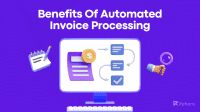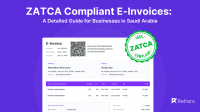The pressure to be competitive makes it increasingly complex for SMEs to manage and handle their financial operations. Automation stepped in, cementing the fractures and smoothening how businesses approached and handled accounting, budgeting, and compliance.
With the best automation tools like refrens, you enjoy more efficiency and reduced human errors. You will be capable of channeling your energies to causes of growth and innovation.
This blog explains how SMEs are experiencing improvements courtesy of finance automation.
- Streamlining Financial Reporting
Real-time updates on the books of accounts mean that SMEs have eliminated manual data entry, which is characterized by errors and is time-consuming. Such tools as accounting software based on the cloud automate report preparations and statements, which are always current with minimum human interference.
Besides, computerized financial reporting systems can ensure accuracy and flexibility in generating customized reports to meet business requirements. This allows management to make an informed decision based on current financial performance.
Instead of waiting for an end-of-month report, SMEs will have access to real-time data, enabling them to be agile in response to changes in market conditions.
- Enhancing Budgeting and Forecasting
Standard budgeting relies much on historical data, and manual calculations are prone to understandable errors and inconsistencies.
Finance automation software has made advanced budgeting and forecasting tools capable of automatically extracting available data from multiple sources for more efficiency and accuracy. It means that SMEs can prepare better financial forecasts with less effort.
Businesses can also set up dynamic budgeting systems that automatically change as financial data fluctuates. This allows SMEs to spot, through this proactive action, any potential issues much earlier and make relevant changes for better financial outcomes.
Also, automated forecasting tools help in scenario planning, enabling companies to visualize the financial consequences of different business decisions.
- Automating Tax Compliance
It is daunting for any small or medium-sized enterprise to keep abreast of evolving tax regulations.
Automation in tax compliance makes it much easier by seamlessly keeping track of any change in tax laws and seeing businesses through the accurate and timely filing of their taxes. Tax calculations, reports, and even electronic filing can be executed through automated systems without manual tracking.
Automation tools also minimize the risk of financial non-compliance, which can be quite costly in terms of fines and penalties. It will, for instance, reduce errors and improve overall efficiency in the tax preparation process. This gives SMEs much-needed peace of mind since all their processes concerning taxation are on track.
- Improving Cash Flow Management
Cash flow management is the lifeblood of any business, especially SMEs. All automated cash flow management tools allow firms to track money flow into and out of the company in real time and give crystal-clear views of their financial health.
The tools further automate payment reminders, collections, and disbursements so that the businesses are always guaranteed to keep the cash flow healthy without requiring the business people to oversee things personally.
In automated cash flow management, timely payment to vendors and contract workers will avoid situations that can result in late fees. It means that relationships with suppliers can be improved.
SMEs may also use an automated system to forecast future cash flows, plan for possible shortfalls, and make prudent decisions regarding investments or expenses.
For a clearer understanding of how to get started, here’s a simple guide on how to build a cash flow forecast that works for your business.
- Promoting Professional Development
Another positive indication of financial automation impacts professional development within accounting teams. To be on top in the competitive race, as shown by the recent report in the Miami Herald about best FE exam prep, one needs to learn continuously and adapt to new technologies. Financial automation tools can become one of those places where the courses will help professionals get updated in corporate finance.
This is where investing in the professional development of people ensures that its accounting teams are endowed with the ability to navigate financial automation-related tools efficiently. It brings more efficiency besides freeing employees to play more strategic roles within organizations and contributing to overall business success.
- Reducing Human Error
Manual data entry is actually one of the leading causes of errors in SME accounting. Financial automation tools reduce these errors dramatically because most of them eliminate the need for manual input. It guarantees consistency and accuracy throughout the financial records.
Apart from decreasing the chances of errors in accounting, automation of accounting also accelerates the speed of processing data in SMEs. As a result, not only does it save time, but the amount of money it takes to correct such errors decreases.
- Optimizing Expense Tracking
Automation will pave the way for expense tracking to happen so smoothly and organically without the business having to revert to painful data entry. Financial software may automatically sort out expenses under heads and categories, generate reports, and even flag unusual spending patterns for further review.
Many of these automation tools integrate with other financial systems, such as invoicing or payroll, for a complete overview of all business expenses. It allows SMEs to maintain much better control over their finances, making sure that costs are held within budget and discrepancies are quickly identified so immediate action may be taken.
- Speeding Up Payroll Processing
In an automated payroll system, workers will get their salaries at the right time and precisely, with little or no human intervention. It helps calculate wages, taxes, and deductions automatically, simplifying payroll processes and reducing errors.
For SMEs, other benefits will be the observance of labor legislation and taxation. The payroll systems are continually updated with the latest legal requirements, which means the businesses remain compliant without having to continuously bear the burden of manual updates. It results in more free time for the proprietors and human resource departments to focus on more strategic activities.
- Enhancing Data Security
While digitizing, the financial data requires progressively more robust security measures. Most automated financial systems have superior security features like encryption and multi-factor authentication, which will keep the system safe from any serious cyber threat. These securities further protect small and medium enterprises by reducing the chances of data breaches.
Most financial automation tools offer regular backups and disaster recovery options, whereby even upon system failure or a cyber-attack, a business can restore its finance data immediately. It also helps the SMEs continue this level of trust with their customers and stakeholders by ensuring the safety of their financial information.
- Increasing Scalability
As SMEs grow, so does the complexity of their financial processes. Automation provides scalability for the accounting operations of any business without adding extra staff or investing in expensive infrastructure. Automated systems can efficiently manage increases in workload to ensure that financial processes remain current and accurate as the business grows.
More so, most automation tools are customizable to suit business needs and allow the business to tailor the system to fit its operations. Such flexibility means a growing business can see the growth of financial automation tools with continuous support without needing an upgrade or replacement more frequently than necessary.
- Enabling Remote Work for Accounting Teams
It enables staff to access major systems from any location with access to the internet by automating tasks such as invoice processing, payroll management, and financial reporting. Accounting cloud-based platforms ensure data is securely stored and available instantaneously so multiple team members can collaborate in real time.
This flexibility reduces the need to work in the office, streamlining operations while fostering work-life balance. Large productivity gains can be attributed to automation relieving the accountant from tedious manual data entry tasks, allowing them to focus on strategic financial planning.
- Facilitating Faster Audits
Financial audits are integral to business survival since they promote transparency and accountability. Automatic systems lighten the audit process by cataloging and retaining financial records in a well-organized, easily accessible manner that cuts down on document and information gathering time and effort during the audit.
Financial automation allows auditors to instantly access the relevant data, verify it, and conduct faster audits. As a consequence, audit preparation costs less and is much faster for SMEs, who can focus all their energies on growing the business and not wasting unnecessary time with tiresome audit preparations.
- Simplifying Invoicing and Payment Processing
Invoicing and payment processing are labor-intensive for small and medium-sized enterprises when everything happens manually.
Automation tools simplify the process by electronically generating and sending invoices, tracking payments, and sending reminders for late accounts. With such help in place, your enterprise will be assured of consistent cash flow and avoid delays in the area of manual invoicing.
It also ensures integrations with various online invoicing platforms with automated systems in place for processing payments. This will help cut down the days between the issuance of an invoice and the actual payment.
In the end, this will improve the overall financial performance while minimizing the chances of late payments.
- Leveraging AI for Smarter Decision-Making
AI-driven automated tools let businesses move beyond mere number-crunching to predictive analytics that forecast, assess risks, and analyze profitability. It enables SMEs to make sound decisions on investment, budgeting, and resource deployment.
AI also helps identify patterns and trends in data that might remain hidden. It means businesses can take preventive measures so as not to be involved in any adverse situation regarding finance in the first place.
Automating the heavy data analysis involved helps take some workload off accounting teams, ensuring key business decisions are highly accurate and timely for growth and innovation in this competitive SME sector.
Endnote
Finance automation is revolutionizing accounting processing among SMEs. Automation tools allow the business to focus on strategic growth instead of tasks and areas that involve accuracy and are usually handled by human accountants.
With these continuously evolving tools, one should expect their contribution or presence to shape further the future of accounting among SMEs regarding competitiveness and efficiency.



















